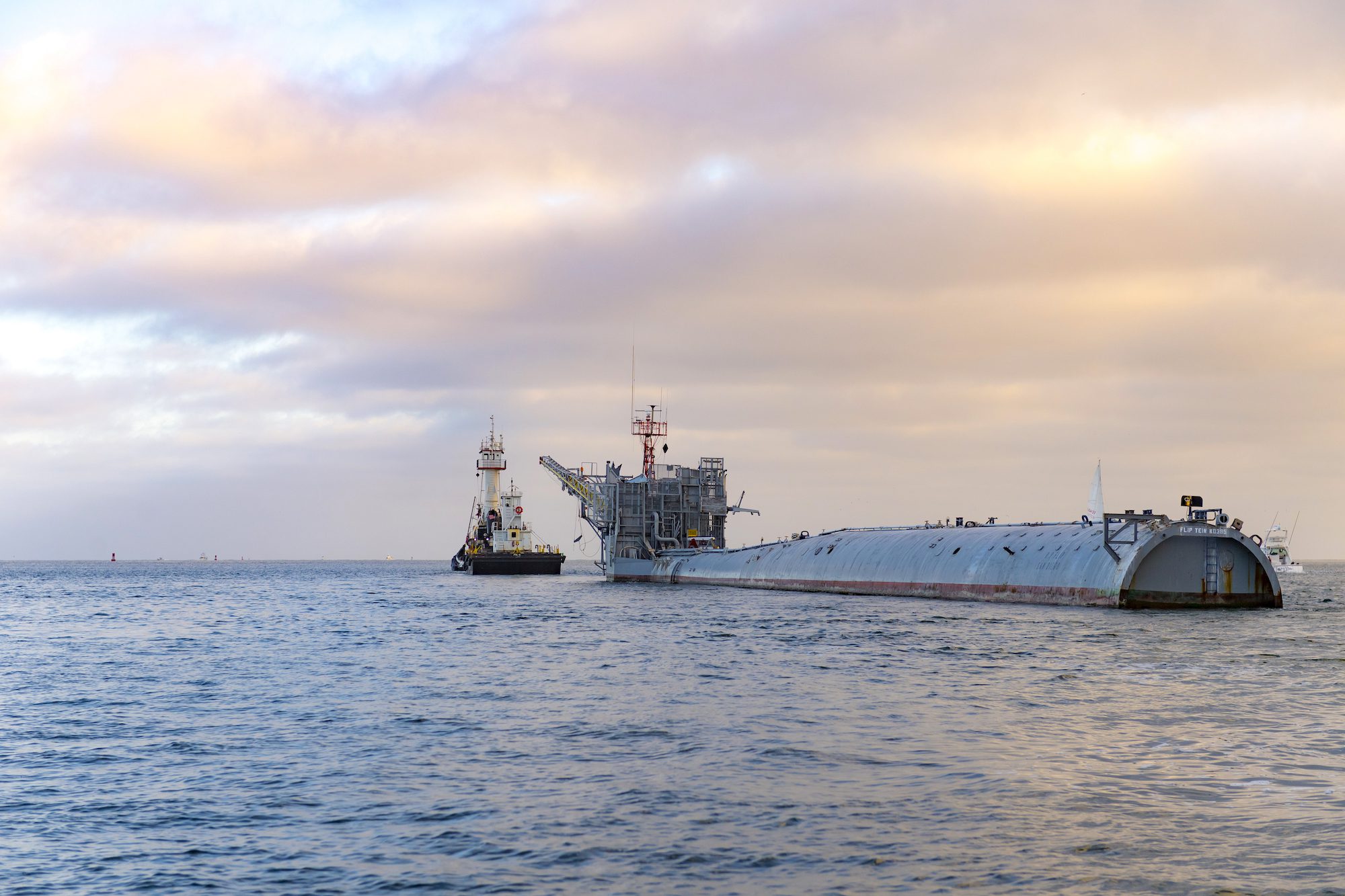Photo: Joe Ravi / CC BY-SA 3.0
Reese B. Mitchell – On June 24, 2019, the United States Supreme Court ruled mariners’ unseaworthiness claims are ineligible for punitive damages. The Dutra Grp. v. Batterton, No. 18-266, 2019 WL 2570621 (U.S. June 24, 2019).
In a 6-3 ruling, Justice Alito’s authored decision reversed the Ninth Circuit’s practice of granting punitive damages in claims based on unseaworthy conditions aboard a vessel. The majority based their ruling on both historical and practical considerations. Punitive damages are awards that punish a defendant by going beyond compensating a person for injuries and monetarily punish an alleged bad actor.
This case arose when Christopher Batterton, a deckhand working aboard a scow off of California, suffered an injured hand after a hatch blew open because of pressure build-up in a compartment. The vessel was owned and operated by the Dutra Group. After being hurt, Batterton sued his employer, the Dutra Group for general and punitive damages based on a variety of claims including negligence, unseaworthiness, maintenance and cure, and wages. The defendant moved to strike Batterton’s punitive damages claim because it asserted such a remedy was unavailable for unseaworthiness claims.
Both the District Court and the Ninth Circuit denied Dutra’s motion based on Ninth Circuit precedent that punitive damages are available for unseaworthiness claims. The Supreme Court granted cert because the Ninth Circuit’s position directly opposed the decisions issued in the Fifth and First Circuits.
Justice Alito began his analysis with the premise that under admiralty law, the Court will look towards ‘“legislative enactments for policy guidance’ while recognizing that [Court] ‘may supplement these statutory remedies where doing so would achieve the uniform vindication’ of the policies served by the relevant statutes.” Any decision regarding the allowance of punitive damages under the various aspects of maritime law required a review of historical precedent allowing for such awards and if “parallel statutory schemes would require such damages.”
Contrary to Batterton’s assertions, punitive damages have not been available for unseaworthiness claims under the common law. Injured seamen have claimed and been awarded punitive damages under the traditional maritime remedy of maintenance and cure which is a separate and different cause of action. The June 24th decision discusses the historical background of both claims.
Maintenance and cure arose during the Middle Ages to protect medieval sailors. Under this doctrine, a ship’s master had to provide food, lodging, and medical services to a sailor injured while serving aboard a ship. This remedy arose because historically a seaman was seen as a ward of the courts relying on judicial protections from unscrupulous shipowners and even their own self-inflicted injuries. Under maintenance and cure doctrine, it is irrelevant whether the injury or sickness results from an owner or master’s actions, but arises from the terms of the employment contract. Under maintenance and cure, it is fair to obtain punitive damages because “vessel owner[s] and master[s] have ‘just about every economic incentive to dump an injured seaman in a port and abandon him to his fate.’”
Unseaworthiness claims arose out of a much different situation in a later age for purposes unrelated to protecting physically injured mariners. In part, this claim gave a seaman under contract to sail on an unseaworthy vessel the right to collect wages even if they refused to sail on the unsafe ship. It was also a criminal defense in cases of mutiny when a seaman refused to obey a captain’s order because complying with the instruction created a dangerous condition. Finally, unseaworthiness traditionally is a claim tied to potential cargo claims arising if a vessel’s unseaworthy condition resulted in damaged or lost cargo. In none of these claims was there any tradition or rationale for providing a mariner with punitive damages against the vessel’s owner. The unseaworthiness claim only provided compensatory damages for alleged losses.
The Court’s decision also examines the ability to obtain punitive damages under the Jones Act, the United States’ principal maritime injury legislation. According to Justice Alito, claims brought under the Jones Act and for unseaworthiness have significant overlap. If a mariner brings claims under both causes of actions, he or she cannot collect full damages for both claims because they both boil down to “a single wrongful invasion of [the seaman’s] primary right of bodily safety and but a single legal wrong.”
Congress intended that the Jones Act adopted and used the Federal Employers Liability Act’s (“FELA”) remedies for railway workers. Courts have construed FELA to provide only compensatory damages for actual pecuniary losses. Based on this precedent, courts have consistently found that punitive damages are not recoverable under the Jones Act. Therefore, punitive damages are unavailable under the parallel statutory scheme to unseaworthiness claims.
The Court’s majority ruling also addresses public policy implications for allowing punitive damages based on unseaworthiness claims. The decision’s majority stated that it would be improper for the Court to engage in judicial activism and exceed the damages permitted under the Jones Act and the common law as established by Congress and previous precedent. As the Court explained, unlike maintenance and cure unseaworthiness claims compensate the injury itself and the losses caused by the injury. The remedy of maintenance and cure offers financial aid for the time necessary to recover from the injury. Because of the potential abuses, a liable party can engage in during a seaman’s recovery period, punitive damages are occasionally appropriate under maintenance and cure.
It is the vessel’s owner and not the master and/or operator of the ship that faces liability for unseaworthiness. It is often the case in the maritime industry that the owner of a ship is not necessarily the entity operating the vessel. Since captains and operators face liability under the Jones Act, which does not allow for punitive damages, it would be unfair for an owner lacking operational control to face potential punitive awards.
Finally, foreign law generally does not allow for punitive awards. The American merchant marine already faces significant economic hurdles when competing with foreign flagged vessels. The risk of punitive liability would be another significant competitive disadvantage that an already overburdened American shipping industry would face when competing with overseas operators by creating greater uncertainty regarding the financial responsibility for seamen injuries faced by American shipowners.
The effect of the Court’s ruling is that American maritime owners face one less competitive disadvantage when compared with their foreign peers. While mariners have lost the ability to bring punitive damages claims against the owner of a vessel under the unseaworthiness doctrine, they still retain the ability to ask for and receive punitive awards against the vessel’s operators under the maintenance and cure theory. Because of the longstanding realities of chartering commercial ships, the injured seaman’s employer is often not the shipowner. Many times the actual owner of the vessel owner is not even responsible for the upkeep of the ship and could be unaware or even intervene in its seaworthy condition.
Reese Mitchell is an attorney at Mitchell & Sheahan, P.C. of Stratford, Connecticut. He is a graduate of the United States Merchant Marine Academy and Tulane Law School. He also holds an Unlimited, All Oceans Second Mate’s License.
Unlock Exclusive Insights Today!
Join the gCaptain Club for curated content, insider opinions, and vibrant community discussions.

 Join The Club
Join The Club











